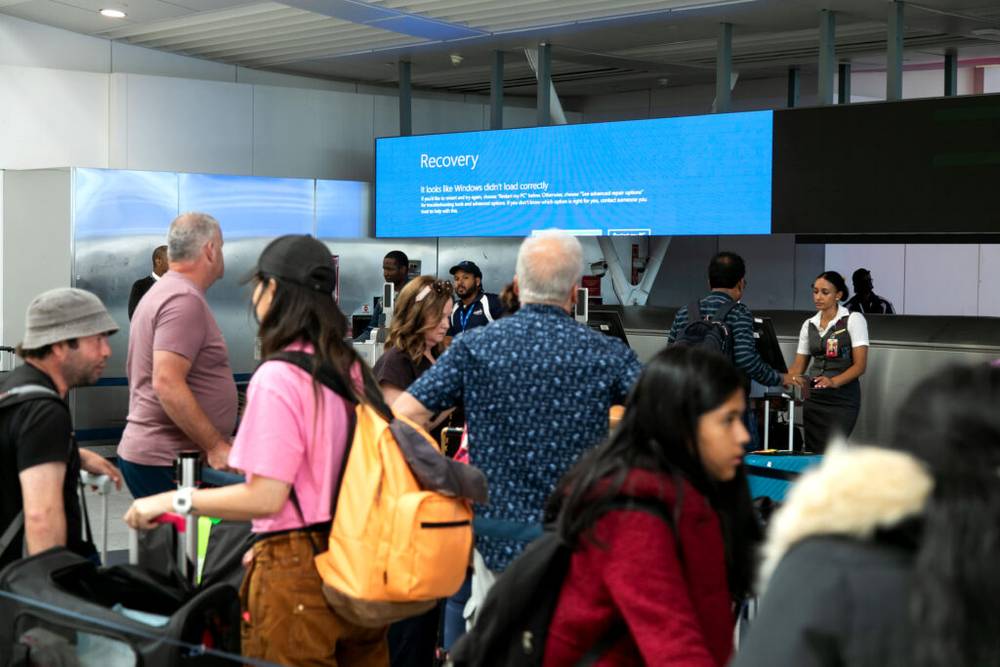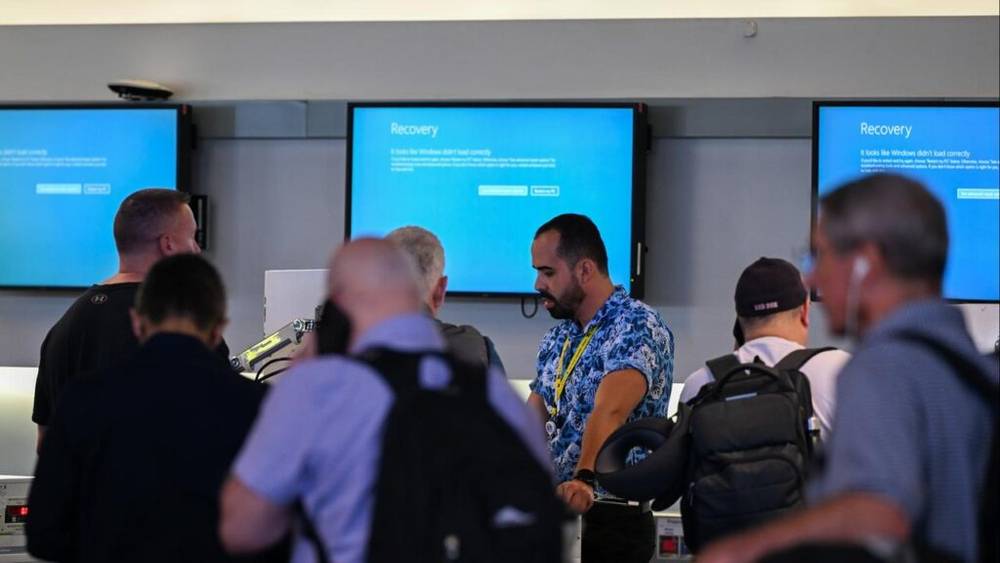
Unprecedented Disruptions Across Industries as IT Systems Fail Worldwide
In an unprecedented global IT catastrophe, massive outages have caused widespread disruptions, halting thousands of flights, crippling online services at airports, hospitals, banks, and businesses, and leaving many Microsoft users facing the dreaded “blue screen of death” (BSOD) error.
Microsoft has acknowledged the issue, attributing it to a conflict involving Windows programs and technology from CrowdStrike, a prominent cybersecurity firm.
Global Impact: A Snapshot of the Chaos
As of 9 AM Eastern Time, over 2,100 flights were canceled globally, with more than 1,200 of these cancellations affecting flights within, into, or out of the United States, according to FlightAware.com. Additionally, more than 22,000 flights were delayed worldwide, impacting over 2,600 flights originating or ending in the U.S.
Major U.S. airlines, including United Airlines, American Airlines, and Delta Air Lines, grounded their flights overnight due to communications issues, as cited by the Federal Aviation Administration. Although operations have started to resume, United has warned that disruptions will likely continue throughout Friday, attributing the chaos to a “third-party software outage” that affected computer systems globally. American Airlines also cited a “technical issue with a vendor” that disrupted their operations.
The Department of Homeland Security is actively collaborating with CrowdStrike, Microsoft, and various federal, state, local, and critical infrastructure partners to assess and address the system outages.
Airports across the Netherlands, Germany, Britain, Israel, Hong Kong, and South Korea were similarly affected, with some staff resorting to manual passenger check-ins due to the digital disruption.

Decoding the Windows Outage
Details about the outage, which also impacted websites, broadcasters, and payment systems, are still emerging. According to Microsoft Azure, issues were first reported midafternoon Thursday. Microsoft identified the preliminary root cause as a “configuration change in a portion of our Azure backend workloads,” which disrupted connectivity between storage and compute resources, subsequently affecting Microsoft 365 services.
Early Friday, Microsoft acknowledged an issue affecting Windows users running technology from CrowdStrike’s Falcon agent, a cybersecurity platform. This problem led to users encountering the BSOD and becoming stuck in a restarting loop.
George Kurtz, CrowdStrike’s CEO, announced that the issue had been identified, isolated, and a fix deployed. He urged customers to check the company’s support portal for the latest updates. CrowdStrike, founded in 2011, specializes in “endpoint protection” and “expert intelligence” to combat cyberattacks.
Official Responses and Remedial Actions
Kurtz attributed the issue to a defect in a single content update for Windows hosts, clarifying that Mac and Linux hosts were not impacted and that this was not a security incident or cyberattack. He expressed deep apologies for the disruptions caused and noted that while many CrowdStrike systems are recovering, full recovery may take some time for certain systems.
Microsoft, in a separate update, indicated that some customers resolved the issue by performing multiple Virtual Machine restarts, although up to 15 reboots might be required. They also noted ongoing issues with accessing Microsoft 365 apps and services, despite the underlying cause being fixed.
Critical Services Hit Hard
Health Care: Numerous hospitals and health services worldwide were disrupted. In the U.S., the Memorial Sloan Kettering Cancer Center in New York paused procedures requiring anesthesia, while Massachusetts General Hospital canceled non-urgent surgeries and medical visits due to the outage. England’s National Health Service reported disruptions to digital appointment and patient record systems, resorting to paper records and advising patients to attend appointments as scheduled. Hospitals in Luebeck and Kiel, Germany, also canceled elective surgeries.
Emergency Services: Alaska State Troopers reported widespread issues with 911 and non-emergency call centers, redirecting emergency callers to alternative numbers.
Paris 2024 Olympics: The organizing committee for the Paris Olympics reported disruptions in IT services affecting Microsoft software, though ticketing systems remained unaffected. The outage impacted the delivery of uniforms and accreditations, with some delegations experiencing flight delays.
As the world grapples with the fallout from these IT outages, the resilience and adaptability of critical infrastructures are being put to the test, underscoring the urgent need for robust contingency planning in an increasingly digital-dependent world.





